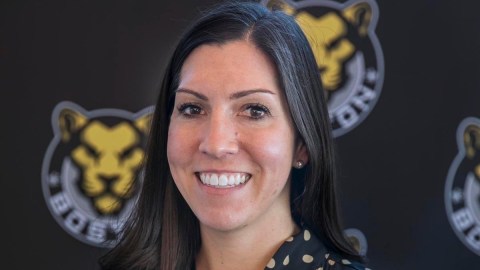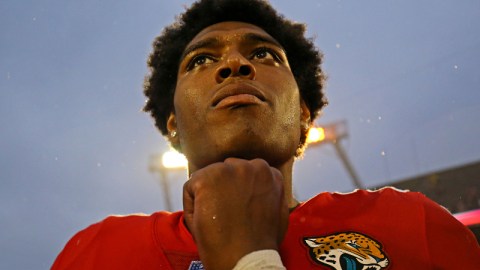It isn't easy being a first-round draft pick. Your name is called, you put on that sweater for the first time, pose for hundreds of pictures, do countless interviews and, suddenly, you're ticketed for the National Hockey League. It's just a matter of time.
From there, a path must be chosen. If you were among the first few selected, you're probably good enough to start apartment hunting in your new city for the fall. Middle-to-late first-rounders, however, have a little more to prove, typically in the form of the minor leagues.
At the age of 18, Joe Colborne wasn't quite ready for the minors — or eligible, due to league age rules — when the Boston Bruins selected him 16th overall in the 2008 NHL entry draft. After two standout seasons for the Camrose Kodiaks, including two AJHL championships and Canadian Junior A Player of the Year recognition in his final year, the B's brass felt Colborne still needed some seasoning and primarily needed to allow time to grow into his body. He was 6-foot-5 but a slender 190 pounds, hardly the ideal weight to avoid getting mashed into the boards by the heavyweights that awaited him in the pros.
So Colborne went to the University of Denver, where he could take on kids who were generally his own age and size, postponing his dreams of the NHL while admittedly better preparing himself in the long run for that goal.
Still, this new transition did not come without its challenges. Colborne was away from home in Calgary, Alberta. It was something hockey had already forced him to face the previous few years, but this time, there were new lessons to learn. How would he handle being on a college campus, surrounded by kids often looking for a party? How would he juggle hockey, schoolwork and time in the gym with all that the college social scene has to offer?
"There were definitely ups and downs and nights where I wondered, 'What have I gotten myself into?'" Colborne remembered. "But then, that's where your family comes in. I talked to my parents, our coaching staff was great, my teammates were awesome in supporting me, and they were all just offering tips.
"The thing I learned was that by sitting there and panicking, you're not helping yourself at all. You just have to take one thing at a time, and sooner or later, things are going to start falling off your list of things to do, and before you know it, you'll be back. It's really just prioritizing."
For Colborne, that included sacrifices.
"Yeah, sometimes you may not be able to go hang out with your friends," he said. "But that's a sacrifice you have to make, and I felt that over my time there, I really learned the times you can go out and have fun and the times you have to go out and bear down and get things done."
Through time management, not a novel concept but one that few successfully master, Colborne excelled at Denver. On the ice, he appeared in all 40 Pioneers games as a freshman, finishing with 10 goals and 21 assists on the way to being named to the All-WCHA rookie team.
Those totals only became more impressive as a sophomore, ranking second on Denver in scoring with 41 points, including a team-high 22 goals, to get a nod on the All-WCHA third team.
Off the ice in the business school, Colborne was a stud in the classroom as well, earning WCHA scholar-athlete status for achieving better than a 3.5 GPA. By his memory, it was closer to a 3.8.
Looking back, the thing Colborne appreciates most was the support from those around him. Whether it was his family and agents always being a sounding board, his Denver coaches and teammates working closely with him, or the Bruins' organization giving him the space to grow within and focus on the collegiate game, Colborne always had a hoard of people in his corner. When it came time to deciding to leave college for the professional game, he needed each one of them.
"It was an easy decision and a really tough decision at the same time," Colborne said. "Since I was 2, 3 years old shooting in my basement with my dad, I dreamed of being a pro hockey player. But, then, the two years I had at Denver were so unbelievable that it was definitely hard to leave the boys, the coaching staff and everyone there.
"But I just felt personally that I had put in the work to get bigger and stronger, and I felt that for my development, it was the best time, and Boston obviously thought that as well. My coaches were really supportive of it as well when I talked to them about it. I think, talking with everyone, it was the right decision to leave at that time."
Everyone was on board, though there was one person who needed a little more convincing than others.
"I think my mom may have taken it harder than my dad, but I told my mom that you can always go back, no matter how old you are, and get a college degree, but you can't always go back and play hockey and follow your dreams," Colborne said. "Once I got that across to her, she's been extremely supportive."
With the approval of his parents, it was full steam ahead. After his Denver squad finished last season with a 27-10-4 record and a trip to the East Regional semifinals, Colborne, now 20 years old and showcasing 25 pounds more mass than when he entered college, signed with Boston in late March and immediately took up residence in Providence. By the time the P-Bruins' season came to a close on April 11, Colborne had appeared in his first six career pro games, tallying both of his points — two power-play assists — in his very first game.
"It was unbelievable for what I needed," Colborne said. "Just the comfort level of knowing that I can play at that level and the comfort level of knowing the guys going into camp next year, knowing what to expect, it was a perfect setup. It was a huge learning experience from Day 1, getting there and talking with the coaches and learning the systems.
"It was a huge, steep learning curve, and I took all of that to heart and kept my ears open the whole time and tried to absorb everything that was said to me from the older guys on the team, the coaches, the training staff, because I know I have a lot to learn about the pro game, the pro season and playing all the games."
The college game and the pro game are very different, not only in size, speed and skill, but also in the durability required. Over two seasons at Denver, Colborne appeared in 79 games. If he stays healthy, that's less than a professional regular season, never mind the playoffs. So Colborne spent the first couple of weeks after the AHL season ended processing everything he heard and learned and designed his summer preparation for the 2010-11 season around that experience.
"It's the preparation in terms of what guys put in their bodies every day," he said. "They're all having protein shakes before and after games, and they're really taking care of their bodies because, as some guys say, 'Your body is now your moneymaker, and if you're not taking care of it, it's going to break down and it won't perform to its top abilities.' Whether that's making sure you're getting in your stretching or your nutrition is so big.
"All that is so important because I've now built a workout program with my trainer and [Bruins strength and conditioning coach] John Whitesides that will help prepare my body for the rigors of a pro season, and also something that will help jump-start me into hopefully having a good first half of the year."
Last season, Colborne had the unique and undesirable feeling of having two seasons come to an untimely end, first at Denver and then in Providence. Should he be in Rhode Island in the spring or summer of 2011, he isn't looking for a repeat of that emotion.
"It was tough because, when I came [to Providence], we still had a very slim [playoff] hope, but it was there," Colborne reflected. "The couple weeks I spent there really just made you even more thirsty to keep going. Then, when we were finally knocked out of the playoffs, it stung, and I can only imagine what it felt like for the other guys.
"No one wants to see that. Anyone who is competitive at all, you just hate that feeling, and that's what you work for all summer, so you don't have to feel that feeling at the end of the year. I don't want to be doing that [this year], no matter what happens. To miss the playoffs is unacceptable and that's what the coaches preached to us in the day or two after, and really, it's just the worst feeling in the world."
Most first-round picks wouldn't spend time dissecting a future in the American League. They'd be waiting for the NHL to come along, just biding time until that ultimate dream comes true. But Colborne isn't most first-rounders.
"No matter where you are, you have two choices you can make," Colborne stated matter-of-factly. "You can either be invested 100 percent or you can be wishing you were somewhere else, and the wishing doesn't get you anywhere. So if I end up being in Providence, from what I saw the last couple of weeks [in 2009-10], it's a great city, a great team and a great atmosphere, so I'm going to be using every possible day to improve myself."
Click here to see photos of Joe Colborne playing for Providence »



